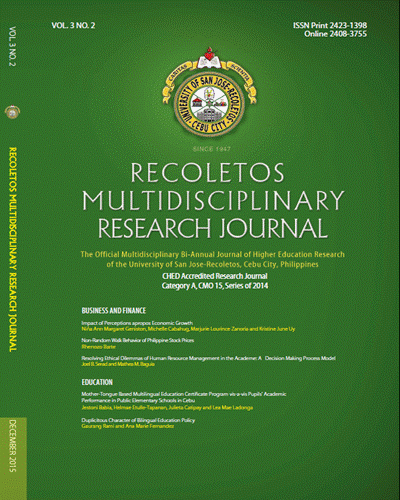A Predictive Model on the Spread of HIV in Cebu City
DOI:
https://doi.org/10.32871/rmrj1503.02.10Keywords:
predictive model, Acquired Immune Deficiency Syndrome (AIDS)Abstract
Human Immunodeficiency Virus (HIV), which can be spread by people’s lifestyle, causes Acquired Immune Deficiency Syndrome (AIDS). Social lifestyles such as multiple sexual partnerships, commitment, protected sex practices, and health checkups are lifestyle factors that can impact on the rate at which entry into any of the epidemiologic compartments S, I or D (death) slows or accelerates. Functional relationships between these social parameters and the disease parameters determined the model developed in this study and used predictive agent-based model to simulate the level of spread of HIV cases in Cebu with base data of the risky lifestyle of BPO agents in the region that could make them vulnerable to infections. Simulation results revealed that there is a rise on the incidence of HIV infections every year, which could become an epidemic in the future if no immediate intervention will be done.  This high incidence of HIV cases in Cebu as evidenced by simulation results reflect the lack of awareness, prompt action, and policy in Cebu City with regards to mitigating the spread of the virus. Sans any intervention, the incidence of HIV infection can accelerate further in the future.References
Anderson & Dahlberg, High-risk Sexual Behavior in the General Population (Results from a National Survey, 1988-1990), 1992
Apalisok, M.G. (2015, May 7), HIV Epidemic. Cebu Daily News
Joint United Nations Programme on HIV and AIDS (UNAIDS), Report on AIDS , 2006
Joint United Nations Programme on HIV and AIDS (UNAIDS), The Cities Report, 2014
Miasco, M. (2015, June 15), Cebu has most Phl HIV cases among male sexual partners. The Freeman
R. Isea and Karl E. Lonngren (2013). "Epidemic modeling using data from the 2001-2002 measles outbreak in Venezuela". Research & Reviews in BioSciences. Vol 7, Iss 1, pp.15-18.
Raúl Isea and Karl E. Lonngren, On the Mathematical Interpretation of Epidemics by Kermack and McKendrick Gen. Math. Notes, Vol. 19, No. 2, December, 2013, pp.83-87. Retrieved online at http://www.geman.in
University of the Philippines (UP) Population Institute, Lifestyle, Health Status and Behavior of Young Workers in Call Centers and Other Industries: Metro Manila and Metro Cebu, 2010
Wilensky, U. (1997). NetLogo AIDS model. http://ccl.northwestern.edu/netlogo/models/AIDS. Center for Connected Learning and Computer-Based Modeling, Northwestern University, Evanston, IL.
Wilensky, U. (1999). NetLogo. http://ccl.northwestern.edu/netlogo/. Center for Connected Learning and Computer-Based Modeling, Northwestern University, Evanston, IL
Apalisok, M.G. (2015, May 7), HIV Epidemic. Cebu Daily News
Joint United Nations Programme on HIV and AIDS (UNAIDS), Report on AIDS , 2006
Joint United Nations Programme on HIV and AIDS (UNAIDS), The Cities Report, 2014
Miasco, M. (2015, June 15), Cebu has most Phl HIV cases among male sexual partners. The Freeman
R. Isea and Karl E. Lonngren (2013). "Epidemic modeling using data from the 2001-2002 measles outbreak in Venezuela". Research & Reviews in BioSciences. Vol 7, Iss 1, pp.15-18.
Raúl Isea and Karl E. Lonngren, On the Mathematical Interpretation of Epidemics by Kermack and McKendrick Gen. Math. Notes, Vol. 19, No. 2, December, 2013, pp.83-87. Retrieved online at http://www.geman.in
University of the Philippines (UP) Population Institute, Lifestyle, Health Status and Behavior of Young Workers in Call Centers and Other Industries: Metro Manila and Metro Cebu, 2010
Wilensky, U. (1997). NetLogo AIDS model. http://ccl.northwestern.edu/netlogo/models/AIDS. Center for Connected Learning and Computer-Based Modeling, Northwestern University, Evanston, IL.
Wilensky, U. (1999). NetLogo. http://ccl.northwestern.edu/netlogo/. Center for Connected Learning and Computer-Based Modeling, Northwestern University, Evanston, IL
Downloads
Published
2015-12-03
How to Cite
Velez Jr., J. D., Villeta, R. B., Padua, R. N., Hao, R., & Colina, M. (2015). A Predictive Model on the Spread of HIV in Cebu City. Recoletos Multidisciplinary Research Journal, 3(2). https://doi.org/10.32871/rmrj1503.02.10
Issue
Section
Articles
License
Copyright of the Journal belongs to the University of San Jose-Recoletos


